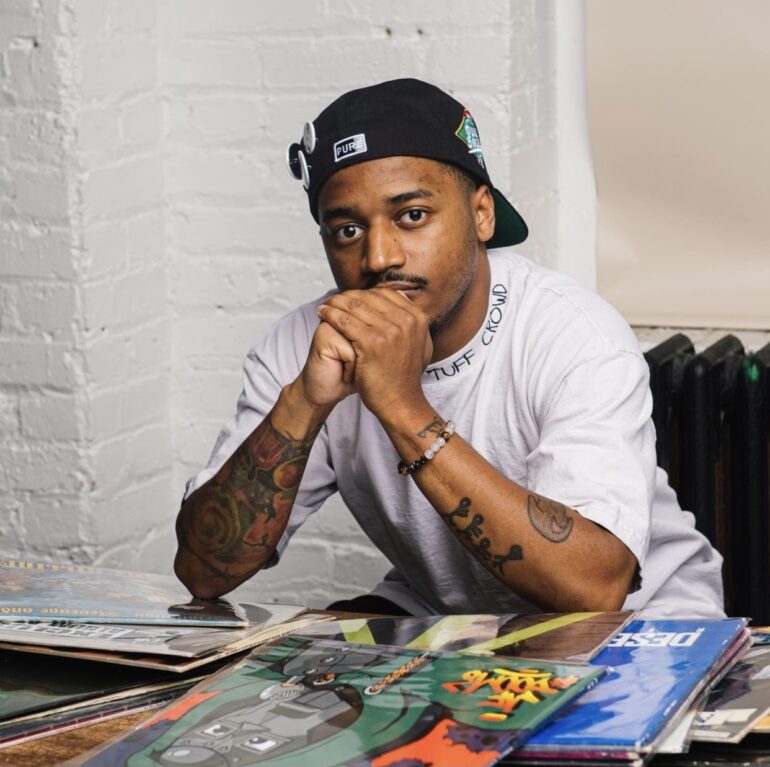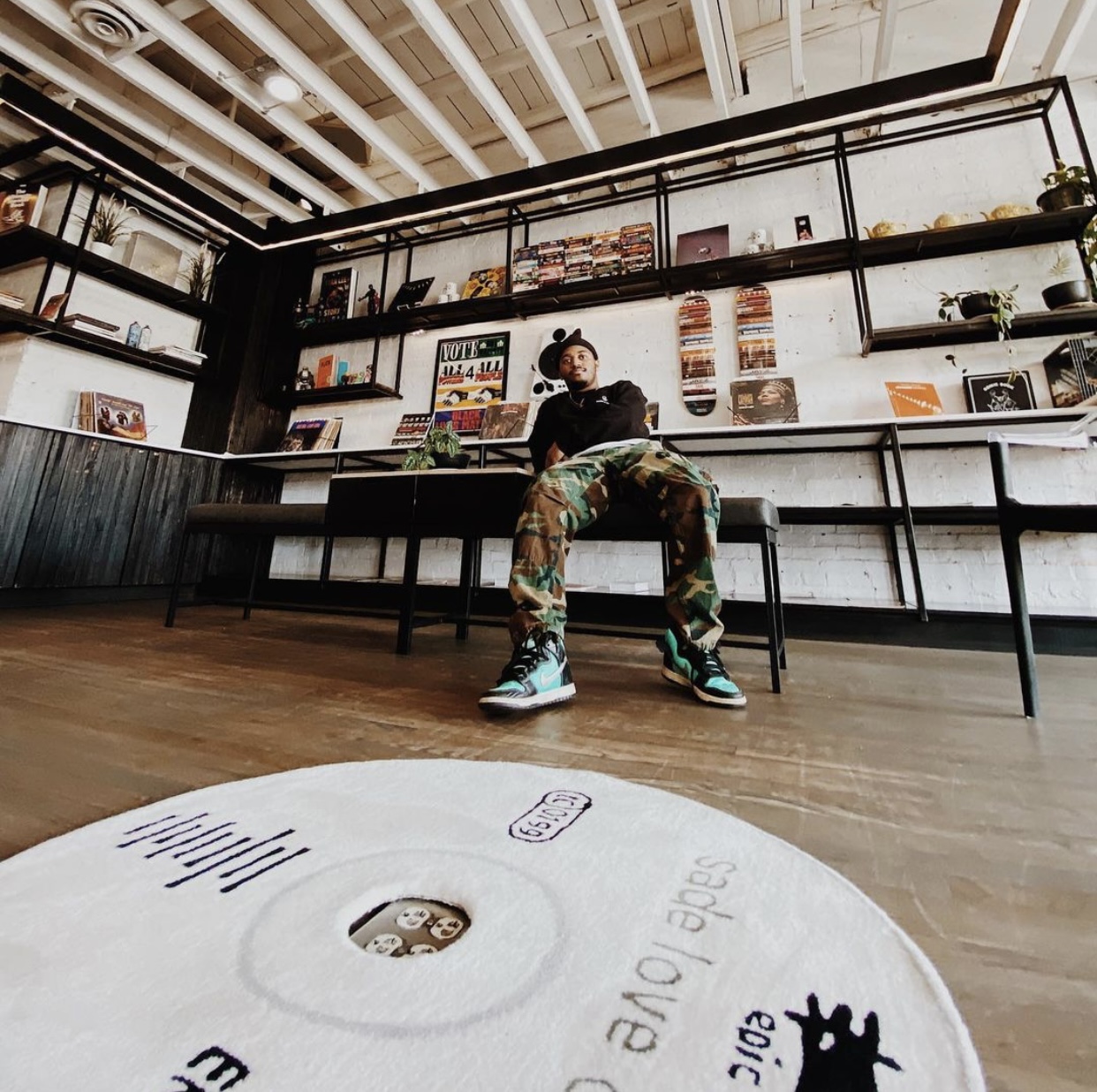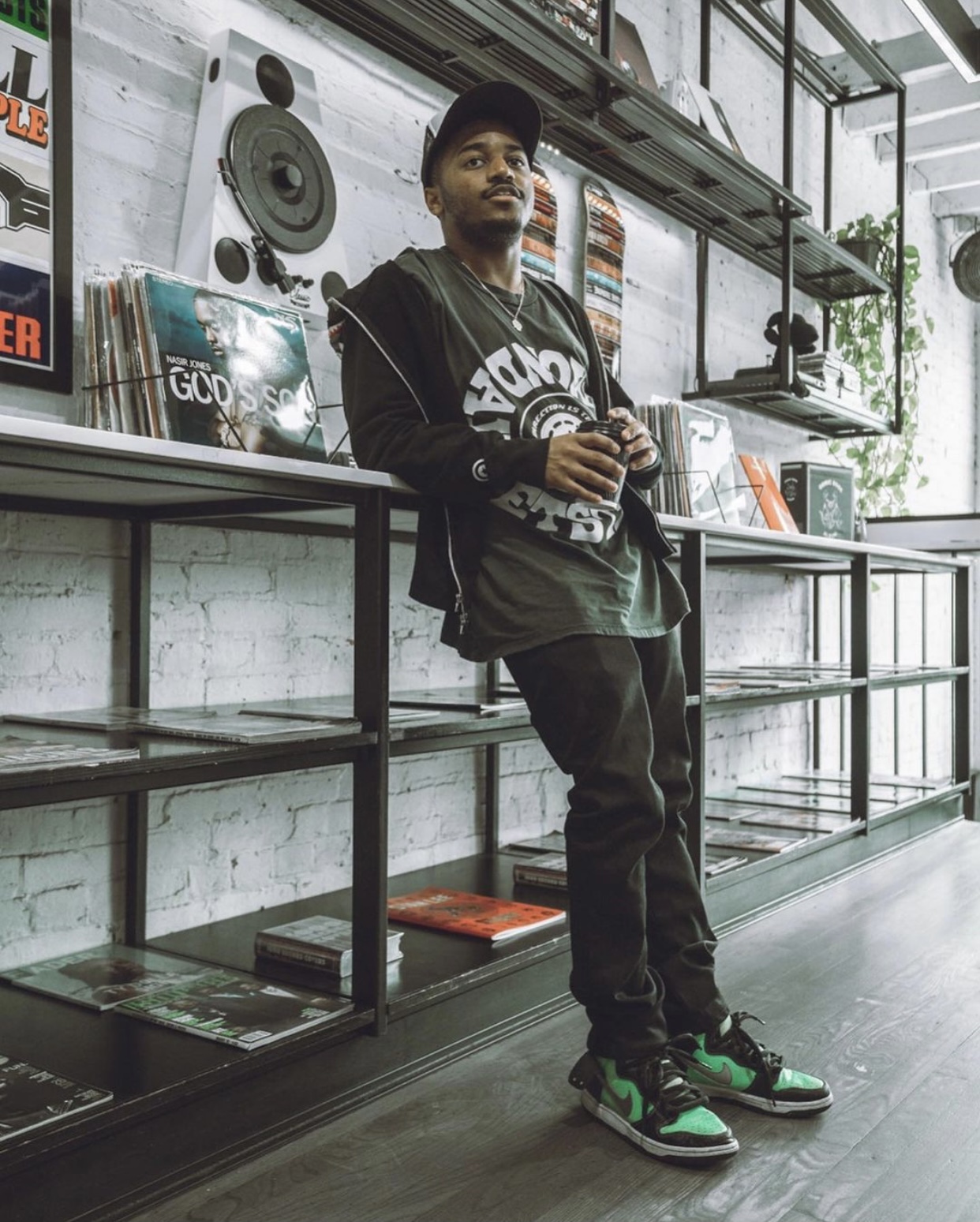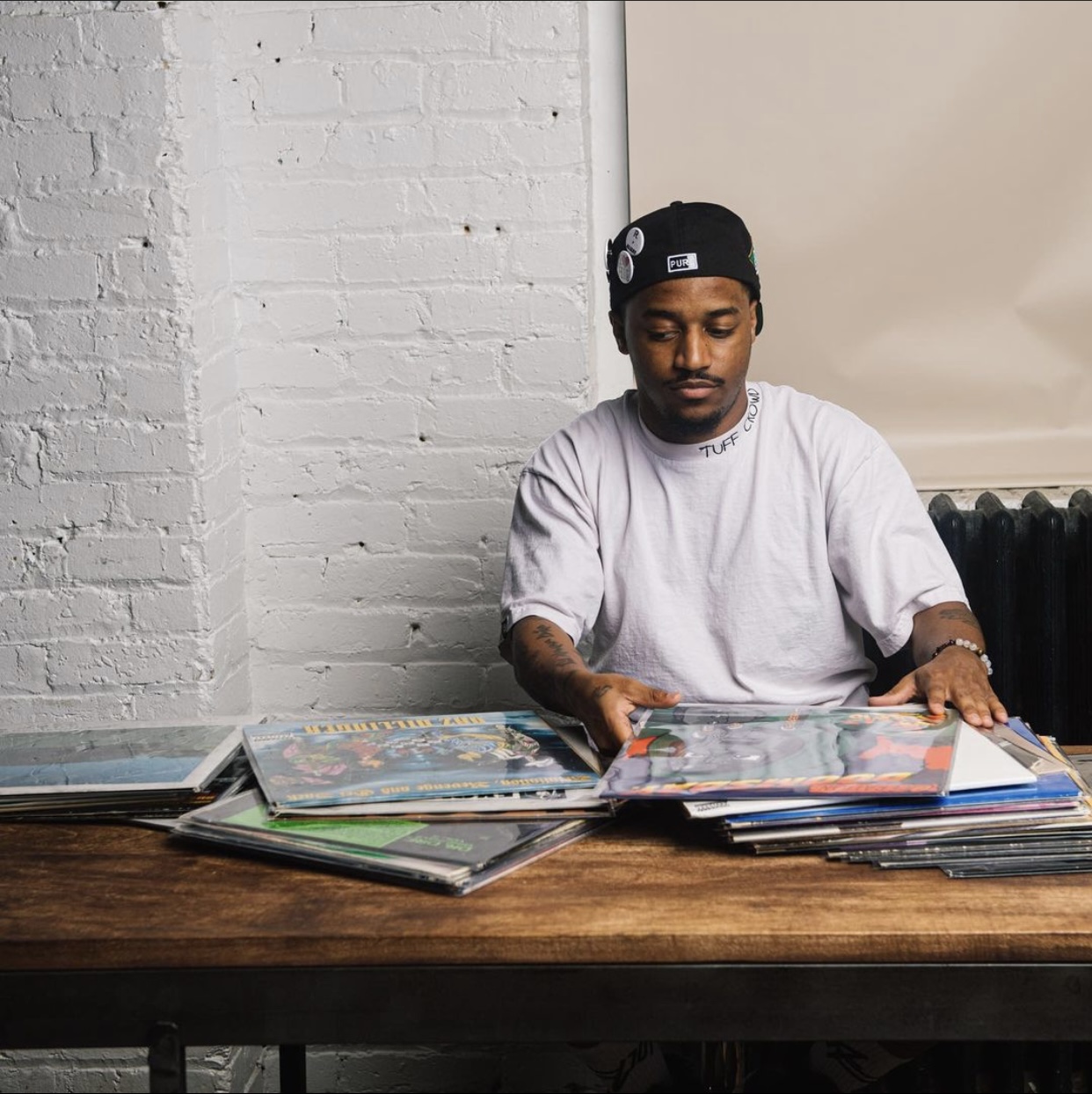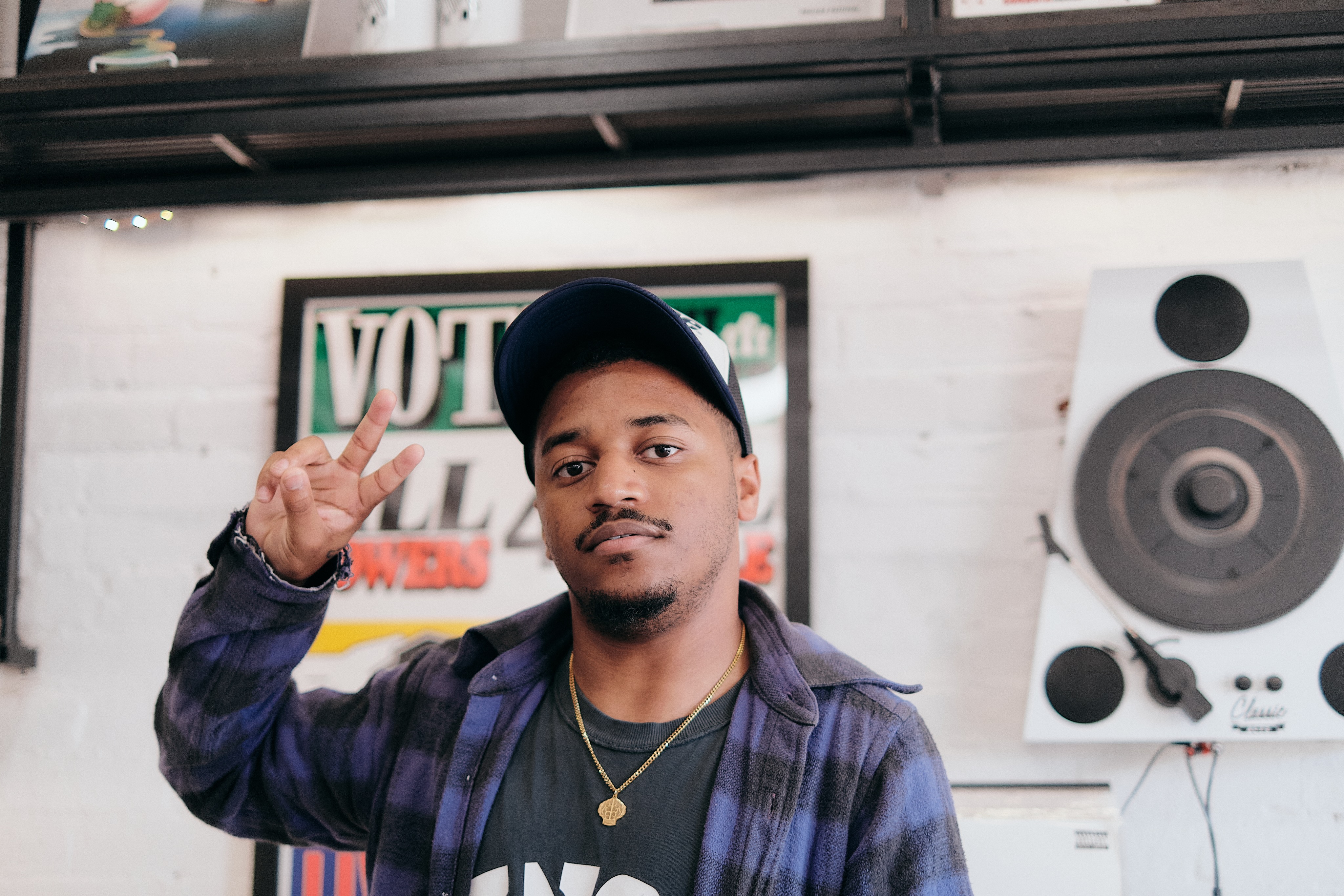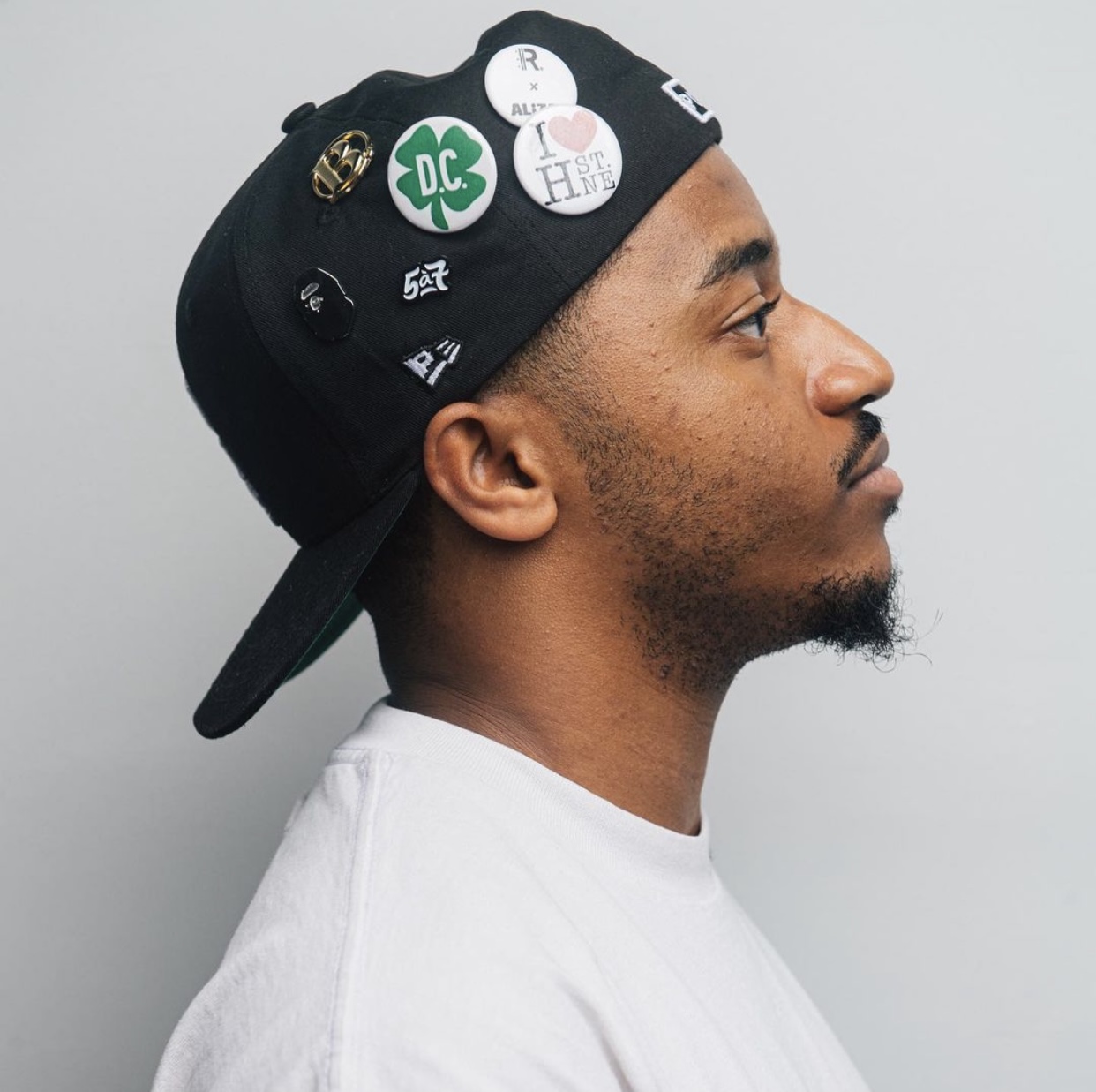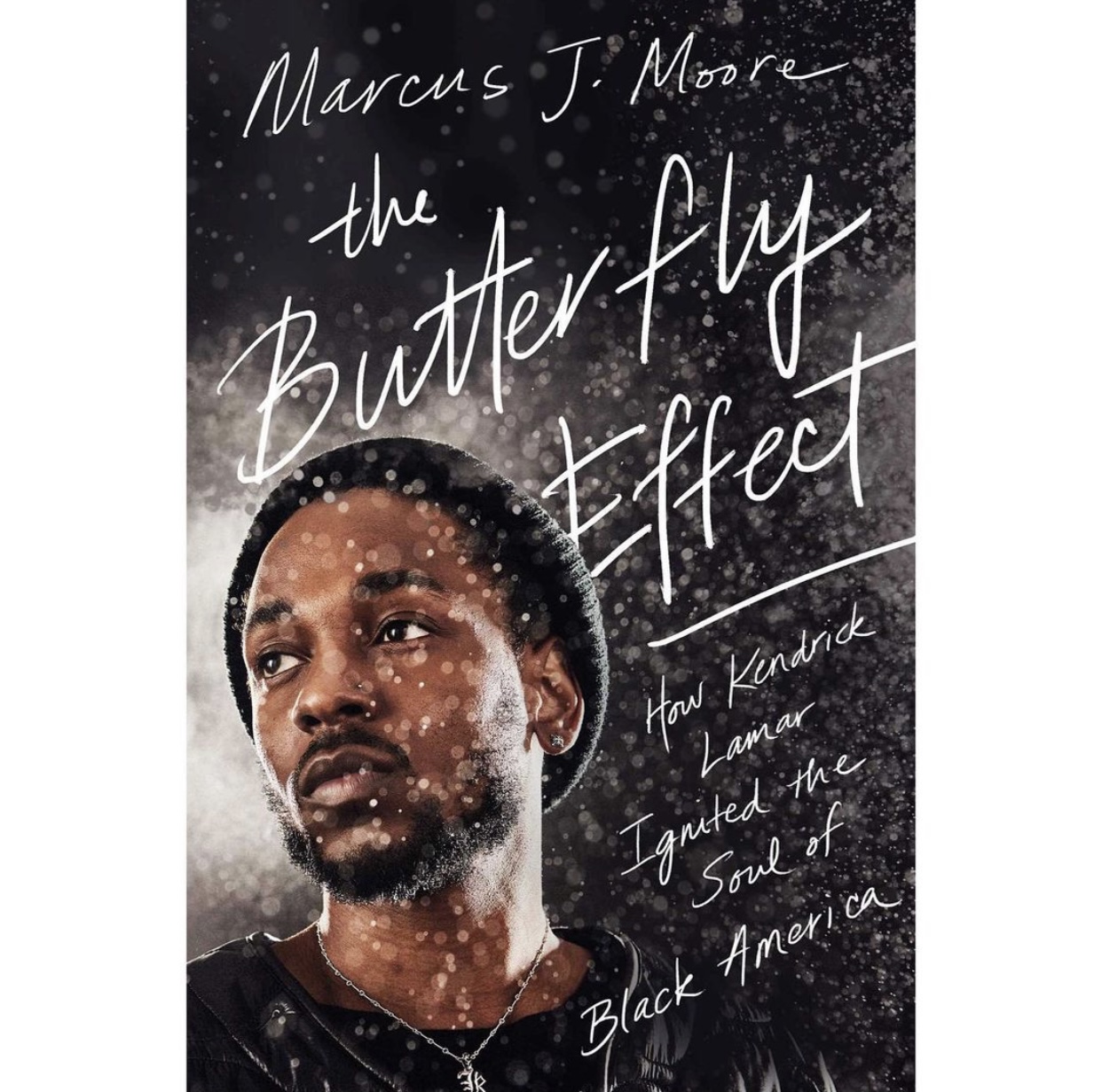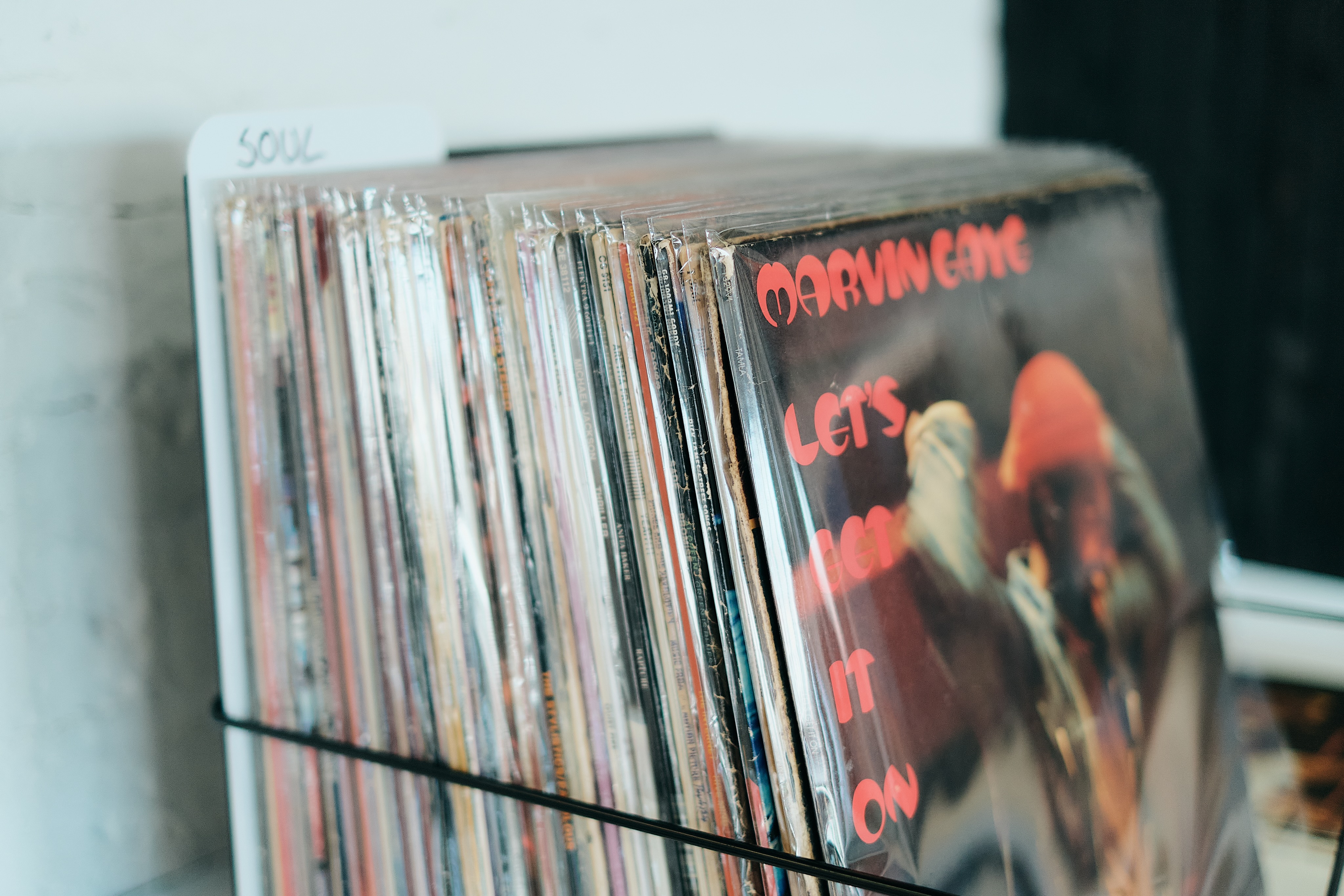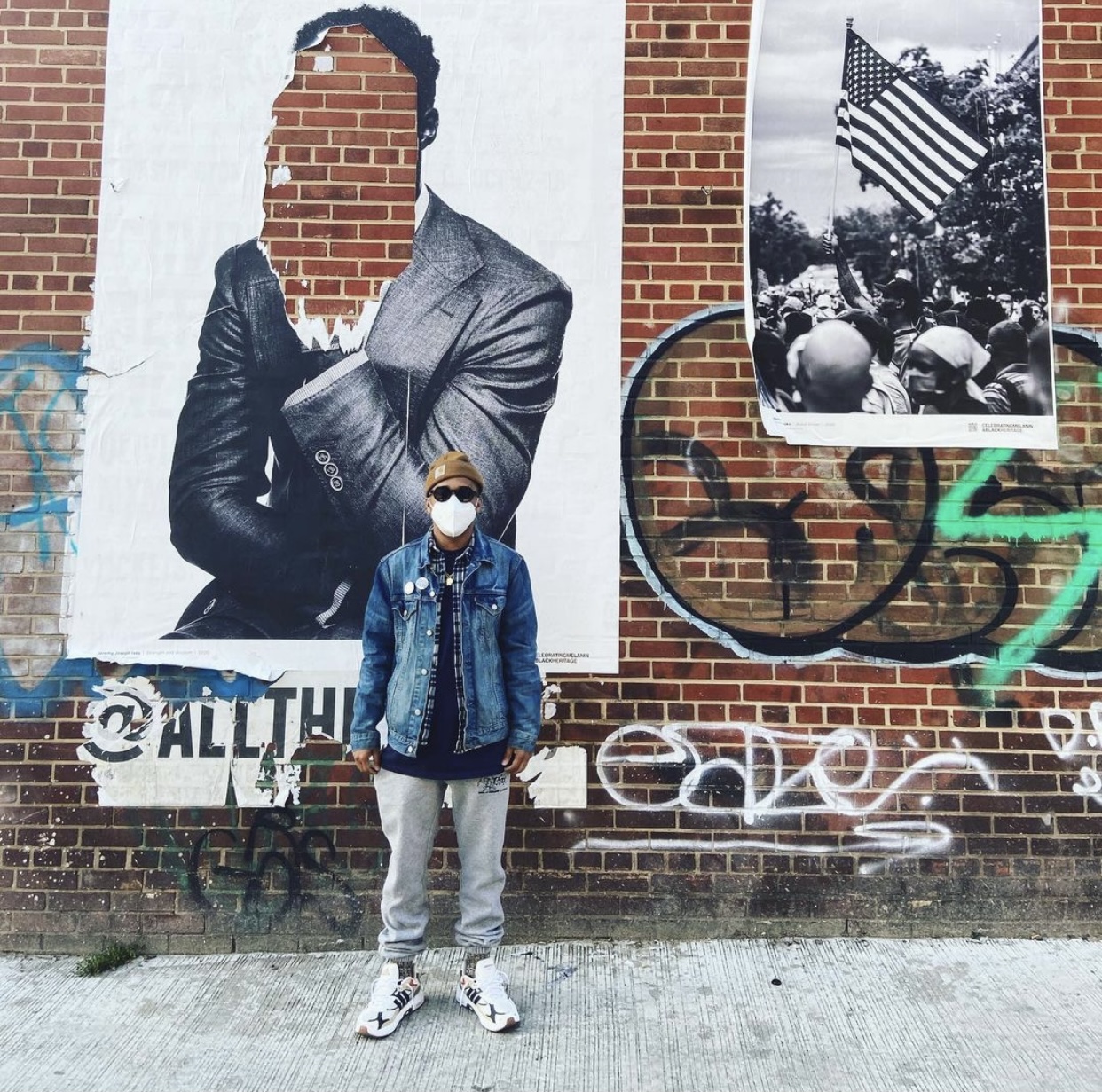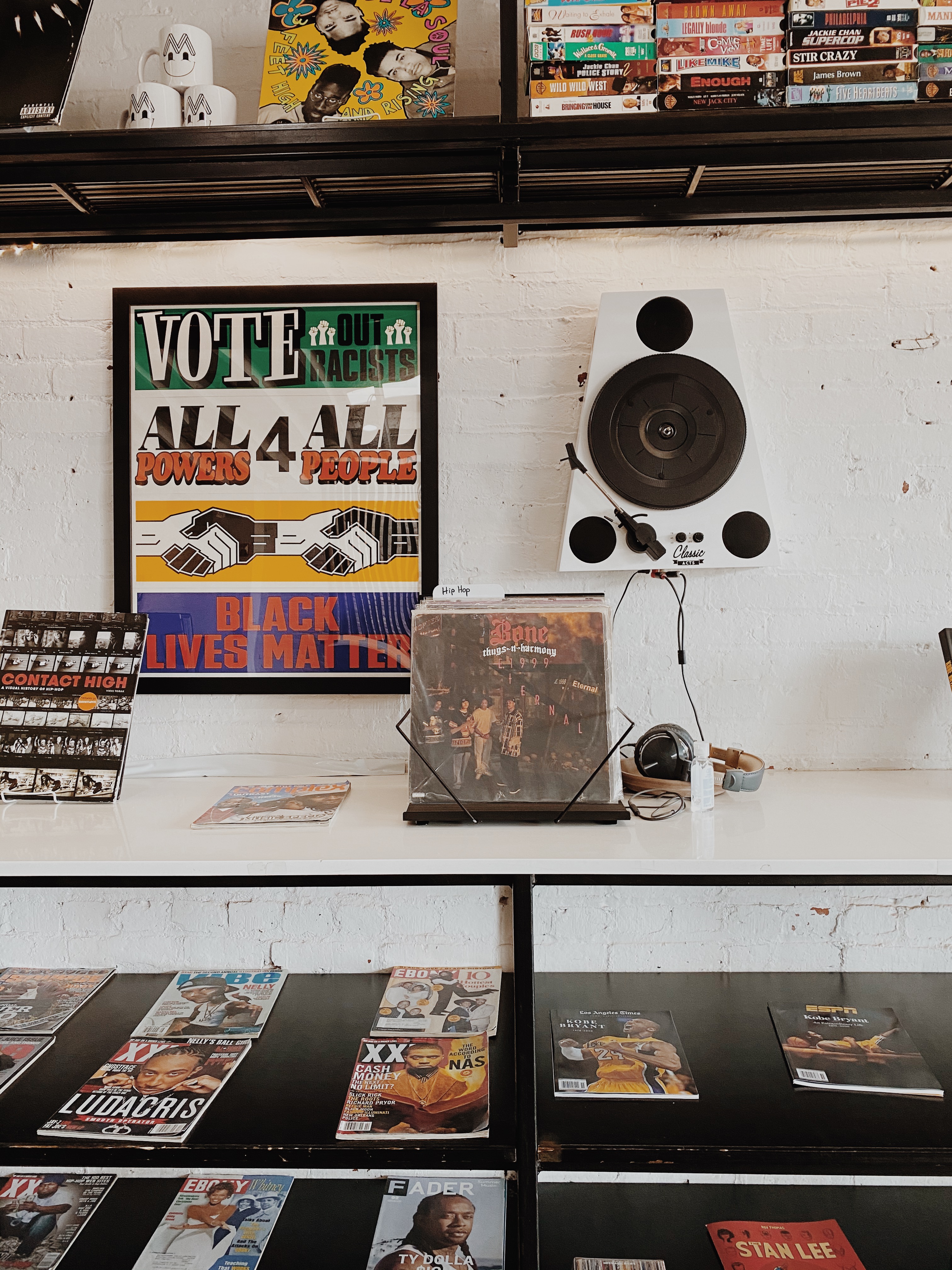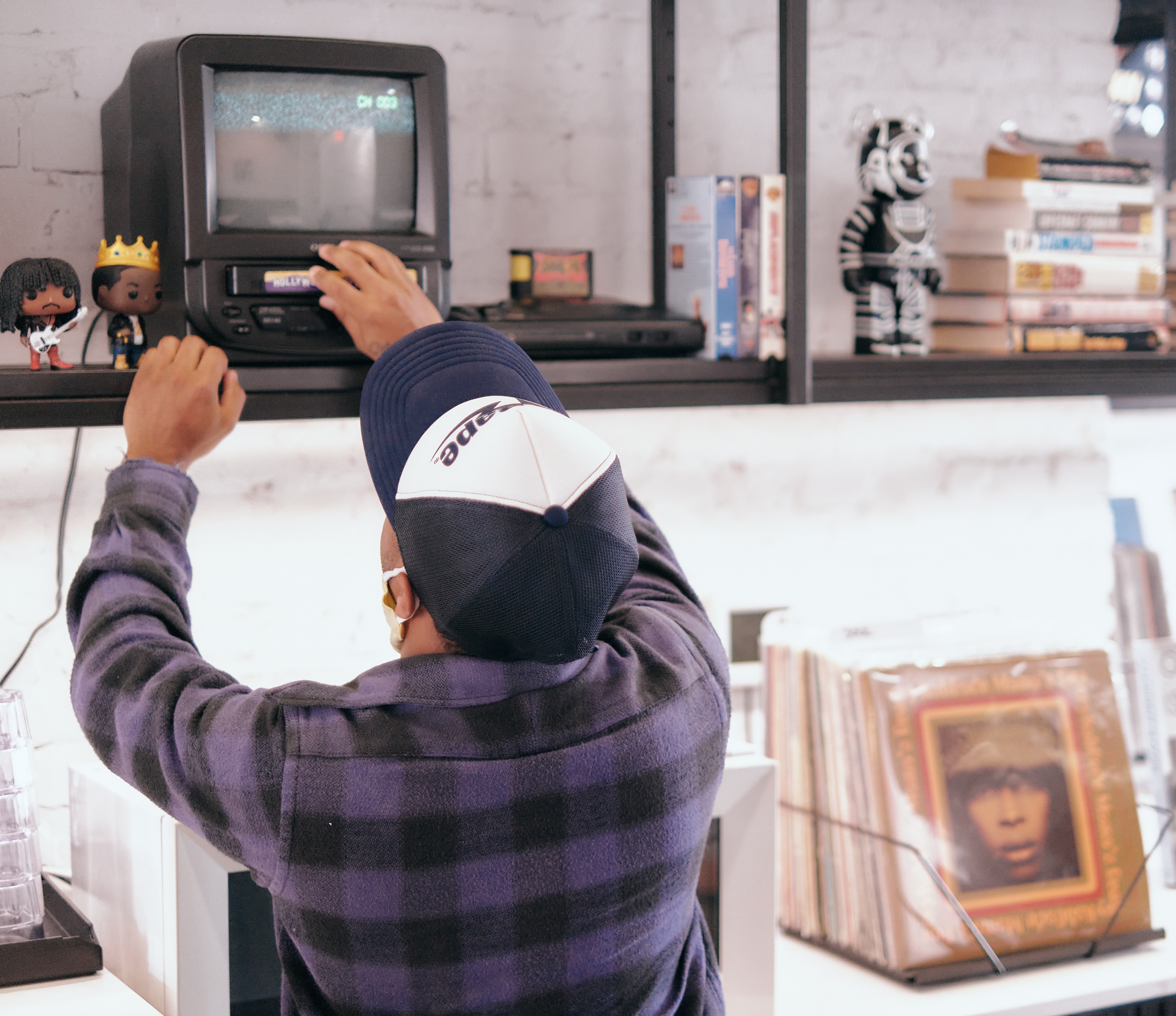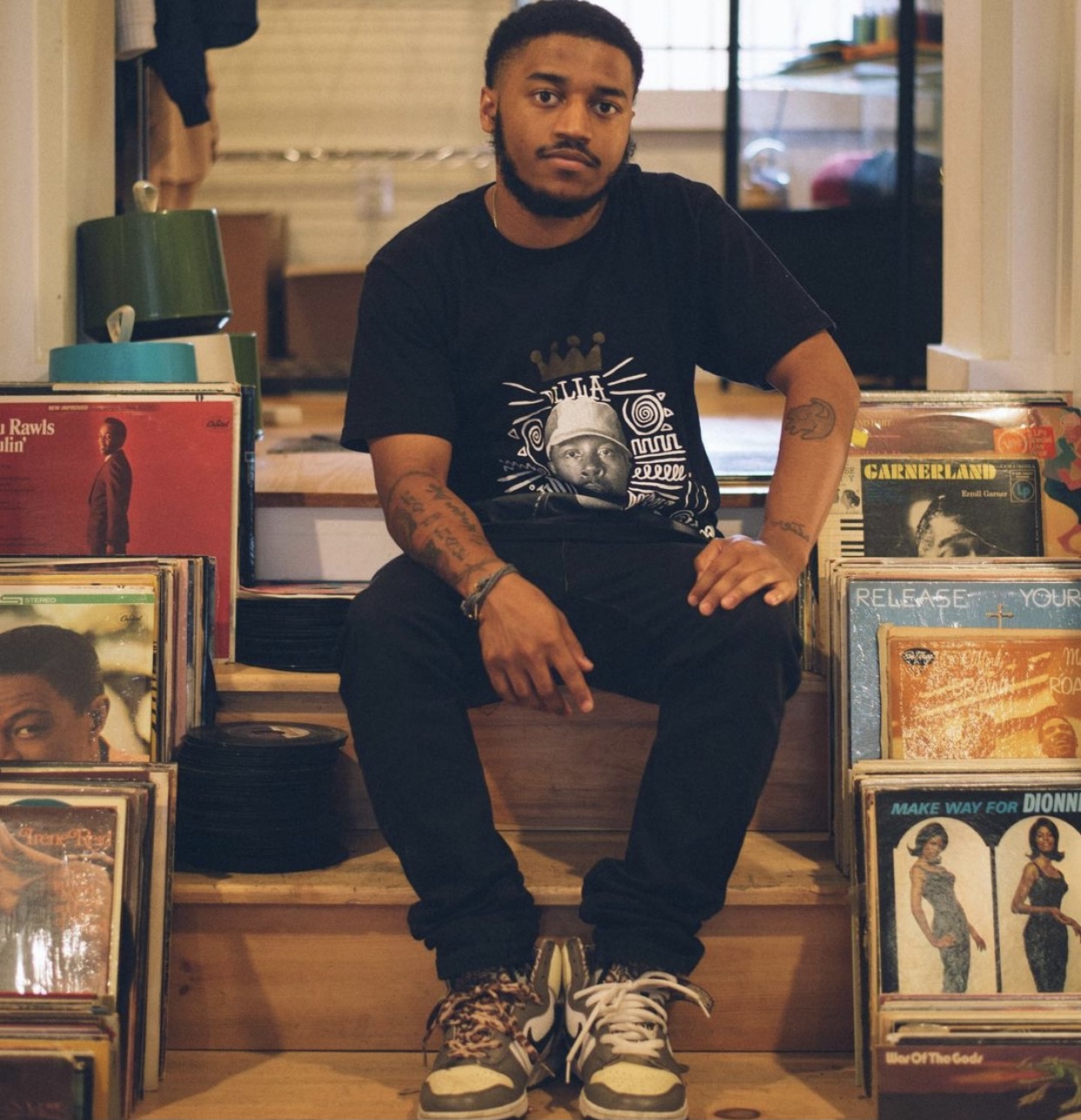It’s rare to find a space where music heads can gather for conversations about the different eras of hip-hop, have a coffee, or even grab some food on the first floor, below the shop, at a Cambodian and Taiwanese restaurant while listening to some good jams. But most importantly, just becoming educated on the history behind hip-hop and Black culture through books, magazines, and records.
That is what 28-year-old Matthew Talley, owner of the Cool Kids Vinyl record shop and manager of Maketto, in Washington, D.C. has brought to life for his people.
What started as just an idea from a passion of collecting vinyl has turned into something unmarkable for the Black culture in DC. Especially since gentrification in the area has affected the culture.
Talley is not new to the vinyl environment, as he’s hosted his exhibit, Diggin’ Thru The Crates, which revived the 70s and 80s experience of physical records and DJ engagement. It also helped inspired the Cool Kids Vinyl shop to be what it is today.
The shop opened its doors on Sept. 1, and it is slowly getting that feeling of being a business amidst the pandemic. Although Talley has been facing one of his biggest challenges yet for Cool Kids Vinyl, he continues to stay motivated and grateful for the progress of the record shop. He also looks forward to bringing on more programs and events for his customers.
True Urban Culture was able to speak with Talley about the process of developing this creative space, the importance of its connection to hip-hop, and his challenges during the pandemic.
1. How did the name Cool Kids Vinyl come about for the record shop?
My company that I pretty much put everything under in which I create is called Connecting Cool. I published a book under that business name and started a few podcasts. It’s almost like my parent company, so to say. So we always wanted to keep the ‘Cool’ type of theme with anything that we do. That’s pretty much how the name came about.
2. Your shop is located above a restaurant in D.C., can you tell a little about how that worked out?
I’m actually a manager at Maketto. Maketto is a marketplace, so to say, that sells Cambodian and Taiwanese fusion food. We sell retail – clothes, shoes. We have accounts with APC, Mason Margiela, Puma, Vans, and we have our own personal Maketto line. And it’s just a really creative space, where we do a lot of eclectic events, we do readings, we do a host of things, and during COVID, we were kind of thinking [of] – when we open back up, what are we going to do to kind of revamp Maketto, or at least put a different spin on it to attract a different audience and keep that everyday block of [the] traffic of age group still interested and engaged in our business.
I had an idea, probably around this time, last year to open up a record shop – a coffee and record shop – and because of close to [the] pandemic, a location that I was scouting the construction kind of stalled on it. So, the owner of Maketto, Erik Bruner-Yang, [had] suggested that I put the vinyl shop on our second floor, which previously was our café. We sell coffee, and people come and do some co-working type of stuff, almost like a modern version of a Starbucks – the upstairs of Maketto’s. Revamping that and turning it into a record shop was almost seamless just because [of] the interests and I would say cachet that Maketto already has.
I say one thing that we can all agree on – not politics or religion – the two things are food and music. The music is already a good focal point at the restaurant. Myself and our GM Adam, we’re just music nerds, so we would make all the playlists for the restaurant and anything like that. It kind of had a seamless transition to this is a really dope space that there’s really dope food and really good coffee, you know, that had dope music playing always.
So to have a record shop compliment that was almost like a ‘duh’ type of moment. It’s been open since September and we’ve had a really good response from it and once these cases kind of subside, we want to start doing some live podcasting up there, some after-hours performances, almost like some NPR Tiny Desk performances. It’s really good and compliments Maketto as well.
3. What was the process like while developing your shop, from gathering materials to the layout?
For about the past five years, I’ve been doing a traveling hip-hop exhibit that we call Diggin’ Thru The Crates. It is an exhibit that we did for a few years. We had a couple in L.A., we had one in Chicago, and just recently, before the pandemic, we went on a five-city tour that was sponsored by Mass Appeal and Monster.
And the basis around that was having people in our new generation interact with music again. So, really taking it to that late 70s, early 80s creation of hip-hop, in the park type of thing, where a patron of giving the DJ a record and asking him to “play this,” and the DJ plays it. The event was: you come to it, you dig through hundreds of –maybe a thousand or so records – new and old and whatever you pick, the DJ would play it.
So it’s almost like an event where the patron engagement was the fuel for the event. It’s a compliment that we really [encapsulated] what a golden era, 90s room would look like if your like 17-years-old in 1996. We had an original stage that people could play original games from that era. We had magazines [and] we had literature. We had everything that could really like, entertain you, but also educate you on why or how hip-hop is the most dominant, most influential culture in the world. A lot of people say that, but it’s like, ‘Hey, how did it get to that point?’ To have different magazines, books, and all these other things that complement the actual event itself makes it entertaining, yes. A really dope event to go to, yes. But also educational.
So, translating that into a brick and mortar stamp alone space – I mean, a sense of just taking the material alone – but also adding different textures to really make up a space inviting. You want people to turn, you want people to stay there for 30 mins, or have that second coffee and read that magazine, or buy that record. It’s been a really good transition from the exhibit to a standalone, brick and mortar, this is for sell type of thing. But we also still want to keep that emphasis of ‘hey, this is educational as well.’ This is a place where you can learn as well, you know, [about how] Black people in L.A. learned to maneuver through the riots, or how they organized riots. We have a Life Magazine from 1965, we have the Vibe issue, where Snoop is getting interviewed about his announcement from leaving Death Row. It’s a fuel of different educational standpoints that make up hip-hop culture in a bigger, broader sense – black culture. hip-hop culture is Black Culture.
4. What inspired you to create this space for others?
For me, it’s something that I’ve always been into. [For] most of my life, I was that kid that always caught the tail end of that era. I did have cassettes. I did have CDs. I didn’t have many vinyl, but I caught that tail end of dial-up internet, you know what I’m saying? So, I’ve always been into those types of things. The inspiration for this space is from cassettes and CDs that I’ve had since I was 11 or 12-years-old.
I’ve always been into that. But, also working at a record store previously from my current job kind of magnified that sense of discovery that you get when you search for records. Going to different yard sales. Going to that one grandmother’s attic and getting a bunch of Jazz records from there. I’ve always been that type of digger by nature, so having a space where that is a necessity for the added textures and the different nuances that make up that space, is where my hobbies come in through the folds. I find a lot of really dope things diggin’ through people’s junk, you know? You look up, and you find a Miles Davis record that someone’s grandmother doesn’t see any value in, but it’s a $200 record in [great] condition.
I live for a sense of discovery. We live in a world where everything is pretty much already created, or people feel like they know it all. So to discover something, once you have that feeling, it’s very underrated and fulfilling and not to feel like ‘Oh, I’m late,’ or ‘I’ve been missing out.’
For me, what drives me to keep that hustle and keep that engagement of finding that one thing, or that record, or that piece, is that sense of discovery. And I think that’s what makes the space really personal, inviting and warm for a lot of different people. You can see it online, but once you come in person, it’s like, ‘Oh my god, this is great!’ I love hearing that reaction from people because that’s the reaction I had from finding those things that people are interested in.
5. With everything being digital, why was it important for you to bring out the concept of collecting vinyl?
I think that it’s something that I’ve always stressed. Just the importance of owning physical music, you know? I also use this as an example. I remember when Prince died – this was before you can get any of his music on streaming services – I would go to a record shop and they were selling Prince records for $80 or $100, and I’m like, ‘Damn, these were like $20 a couple of weeks ago.’ But those people realized you can’t get this music anywhere else. You can’t find it anywhere else. And it’s still to this day. I think it’s really sad, one of my favorite artists, Aalyiah, you can’t stream any of her music outside of her first album, but I have her albums on vinyl. There’s plenty of music that’s like that – new and old that are not on Apple Music or Spotify, but you can still buy that physical vinyl.
I’ve always respected and held physical music in a higher guard. I always feel like if you can spoon-feed someone knowledge, then they’ll take it. If you can make a record shop and a magazine shop look cool, then that’ll entice people to own physical music more. You have to meet the consumer half way, so to say.
For me, it’s very important to collect and buy physical music because all this internet stuff and everything can be gone tomorrow. I’m still going to have my music. I’m still going to have what’s important to me and what keeps me going every day, which is music. If you can kind of spoon-feed that to people without them being bored of ‘Oh man, you sound so old,’ then it works.
6. Aside from records, what can people find when they shop at the Cool Kids Vinyl?
We also have a flow of books. We have accounts with Simon & Schuster and Taschen, probably two of the best publishing companies right now. We do have a consistent flow of books, magazines: Jet Magazines, Vibe Magazines. Of course, the records. We have tote bags. I’m hoping for this holiday season; I’m trying to get coffee mugs made. For me, it’s all-new as well. I worked at a record shop for a few years, and I’ve worked at some really cool places, but to have something that is your own, and managing the end reports of making sure they have enough for this person or to last a month. It’s all-new for me, but it’s very fulfilling. We definitely sell more than records. We sell literature, and we sell music – that’s pretty much it.
7. How are you able to get your hands on some of the vintage magazines and books?
That’s another thing too, it’s all a part of the gig. Probably about two years ago, I appraised this guy’s collection. His wife was like, ‘I want him to get rid of all these books and all these vinyl. You guys are a record shop; I just want to see what this stuff is worth.’ So I went out to their house, and I found an original copy of an autobiography of Malcolm X, and he sold it to me for $12 bucks. This was worth a couple of hundred bucks. For me, it doesn’t just stop with the records. I kind of have an eye for almost everything. For me, it’s just that art of the gig type of thing, and you’d be surprised [by] what you find, whether it be books, records, or memorabilia, just different various, collectible items.
8. Has the pandemic affected your opening in any way? And if so, how have you been able to maneuver that?
Oh yeah, the pandemic has put a black-eye on pretty much everything this year. Of course, we wanted to do some type of grand opening and some type of programming, which I’m still planning, but I’m being very cautious in my approach of planning. It’s definitely been a void, so to say, or a hinder with the things that we’ve been wanting to do.
I did want to have some type of grand opening and have media and press come out to cover it. To have people perform in there. To do a lot of different things in there because the space is so beautiful in the way that the record shop complements, not just upstairs, but the entire building is just A1.
Being able to sell in person is great, but also it’s a really strong importance to having an online store as well. I think personally, with this upcoming new president that we’ll probably see another – or really the first – official, official country shutdown. When everything is closed and people of being paid to stay home consistently, instead of just a $1,200 check to last you seven months. Anticipating the close, if anything. We keep our website updated and fresh daily, just so people that are hesitant of coming out, you still get that experience. You still get access to products and inventory.
9. Who are some artists, writers or musicians, that you would possibly want to work with in the future for your shop?
I really want to start a book and cocktail club. I really want to connect with different authors and talk about their experiences in making and creating the books that they’ve created, but also using their books as almost a foundation of conversation. It wouldn’t be too much of, ‘Ok, we’re a book club, we come together traditionally weekly or monthly, and we talk about this book. More so, [how you relate to the book], ‘Oh, you grew up without your mother just like the main character, tell me about that.’ Like different conversations, but the book is more so the foundation of conversation rather than the actual focal point.
I do want to start doing that with an author that published a biography of Kendrick Lamar; his name is Marcus J. Moore. He’s located here in D.C. I would love to interview Marcus. A personal friend of mine is Jason Reynolds, he has a really good book out called Stamp. I’m dying to interview Jason cause we always have good conversations when he comes to Maketto. It’s definitely a host of different authors and creators that I do want to just have these conversations with – over a good cocktail, of course – about books and about their books. That’s something that I’m really eager to start once all this thing clears up.
10. I’ve read that in the past that you were a social media intern for Wale and started the DMV and Georgia Followers. Has that helped you when it came to promoting Cool Kids?
Yeah, absolutely. That was a long time ago, but it was really impactful for me and really helped me in learning the skills that I use now. Of course, I try not to be on social media as much as I used to be. But it’s great because I can take a business model, and I can DM followers and learn how to garner an organic audience and keeping engaged with that audience. Honing in on the different niches and audience that you garner.
So, I learned a lot through that. And of course, interning for Wale, I learned a lot of what not to do and what to do and handling things like [the] press. Like I just did a Washington Post article a couple of weeks ago and just learning different ways to deal with media, press and interacting with customers and patrons, and keeping that relationship going. The art of following up. All these different things that I learned just from running a social media account or running a merchandise page for a tour. You know, doing all these different things that are pretty much grassroots. Type of tactics to garner and keep and feed an audience.
And one of the things that I always say is the best lessons you learn, you learn in kindergarten: If you don’t have anything good to say, don’t say it at all; say your please and thank you’s, this and that. So I take that kind of approach to what I learned early on doing social media, especially interacting or knowing how to interact with people online. That’s a big, big thing for me.
11. What are some records that brought out your love for collecting vinyl?
First and foremost, John Coltrane A Love Supreme. I’ve probably bought and sold that album more than 20 to 30 times now. It’s probably one of my favorite albums like ever. It’s a quote from Coltrane that’s in his documentary on Netflix; he says that he made this album for God as an appreciation for love. And it’s like yo if a person goes into an album thinking that ‘I’m going to make this for God, for Him creating love,’ is like you’re on a different frequency of creating music. And your appreciation for it is just on a different level. That’s one album that always sticks out to me is John Coltrane and A Love Supreme.
12. I saw that you recently put out a mix called “Baby Hair,” that featured Aaliyah, Erykah Badu, Drake, and more. How often do you find yourself creating music?
I would say more than I would put out. For me, it’s like, I like making mixes and keeping it for myself to listen to. I always want to put out a least one per season just to kind of capture the essence of the season. So, I put out one in the spring going into the summer. I put out a summer one. I guess this “Baby Hair” one is like a winter. One that a lot of love songs, a lot of Drake, a lot of Aaliyah. I try to put out every year, one per season. For this one, more so of just expressing my relationship goals and I guess seasonal emotions, I guess. I’m glad people can enjoy it and relate to it.
13. Is it something you plan to do more of?
Yeah, of course, just because I’m not personally comfortable DJing at the moment. I’ve been offered a view gigs, a few Instagram Live stuff, but to me, it’s just not the same. And putting out mixes now at a higher volume than I’m used to, I guess that is because of COVID because I can’t go to a place and DJ, or a lounge to DJ. You see a lot of different DJs doing it now too; you know, just putting out more mixtapes and more music in general. For me, I’m probably just going to take the remainder of the year off and – depending on how things are next year – most likely the next six months of the new year too. If I’m not going to be DJing anywhere, then I might as well release all these mixes that I’ve been making.
14. What are some future goals you have for Cool Kids Vinyl?
For me, the goals aren’t really anything of – and it may sound weird – like business-wise and financial wise. I just want to create a really dope space that people can gravitate to, to have good conversations, to be stimulated, mentally, and emotionally. Almost like a safe haven for people to convene that – that is a major goal for me. There are two guys that I know, and every Monday, they come to the record shop, and they work on their laptops, they take their calls. They grab food. They grab records. Like that is something to me that is like ‘wow.’
Out of all of the recent success that the record shop has had, that is – for example – that I pride myself in the most, or I take to heart the most is: people coming in and feeling comfortable enough – especially during the pandemic – to be here weekly, to work here, to take out that laptop, to take the conference call here, and to just be in a space where they feel like ‘this is for me.’
Gentrification has completely swallowed D.C. slowly, but shortly – especially during the pandemic – there were so many places that were for us and for my people to go to, where we felt comfortable, that are gone now. So, to have a place – especially on H Street, a historic street in D.C. – for people to come to and feel like I can be myself here, I can shop here, I can take my girl here, I can take my man here, I can have a good time here, and I can learn here. That is probably the biggest goal for me to create, to expand that, and keep that momentum going for people. Because this space is dope, it’s a great Instagram picture and everything, but I’m always stressing to keep this space for us. The main goal for me is to maintain and keep this place fresh, inviting, and stimulating for people.
15. What are some challenges that you’ve come across while developing your store?
First and foremost, the pandemic. The pandemic has been everything like I can not wait for this thing to be over. I’m really encouraging people to just wear their masks and just like don’t stand anywhere near me (as Talley laughed), just so this thing could pass. I haven’t even had the opportunity to experience new business or small business roles because everything is different now. The detriment to everybody, whether you’re a million-dollar business or a thousand dollar business, is the pandemic.
I haven’t even had the opportunity to experience those types of normal small business roles because of the times now. It’s not just small businesses struggling, it’s major businesses, it’s everybody struggling. The only hinder that I experienced is COVID. And of course, I’m anticipating it more, after the fact that I’m well aware that [there will be] some months, or some weeks that you’re not going to make the money that you thought you were going to make, or what you used to make. You’re going to have opportunities, or things don’t pan out the way you see them, or you see a little more losses than you experience wins. But that has been [encapsulated] by COVID. We haven’t even had the opportunity to experience those different things because of this [pandemic] that we’ve been accustomed to now for a couple of months maybe – close to a year now. I would say just the pandemic in general.
16. What do you hope that the new generation will pull from the Cool Kids Vinyl?
What I would want them to really grasp is – and you experience it when you walk into the shop – when you say vinyl or anything of physical music to a kid born passed 1996 or 2000s [they think], ‘Oh that’s just for old people’ or ‘that’s just an old thing.’ And it’s like, ‘Yo, we have Future on Vinyl.’ We have 21 Savage on vinyl. We have different things that can kind of – not just product but aesthetically – bridge that gap. There [are] things that will make your dad want to come out, or your mom want to come out to get a record, and you also see like ‘Oh man, I didn’t know that Complex made magazines in 2001.’ There are different things that connect those generations. And like I said, the two things that anybody and everybody can find common ground on is food and music.
17. Where do you see vinyl going in the future?
I think vinyl is one of those things that is always going to be around. We’re noticing now that a lot of different, major companies sell vinyl now. I mean, I’m not buying a record player or a vinyl from Urban Outfitters, but they sell them. Best Buy sells them. Walmart sells them. Any way that people can find a way to connect with the older model technology, I’m all down for it. I would just suggest that you don’t buy from Urban Outfitters (Talley laughed) it’s just cheaper material, you know, just the fact that they sell them. What I think in that, I think if you can find the dopeness in it, like ‘Wow, they didn’t sell this five years ago.’ It’s definitely a thing that not just avid record collectors notice, but even now these big businesses and corporations notice. There is money in vinyl. There is a niche of people that buy vinyl. There’s a niche of people that want to buy record players. So, the fact that major corporations and companies sell vinyl now is great.
I just discovered here in D.C. that there’s a hotel called Yours Truly, and they have a whole record section in their lobby. They have a DJ booth in their lobby. They sell records, they sell clothes, and I’m like, ‘Oh wow, this is interesting.’ For me, it’s like, I eat the fish and spit out the bones. Is it a bit gimmicky? Yes. But just the fact that you see that, ‘Hey, this is something that we can do, this is a niche that we can take from and sell, and try to make some money from.’ I respect it. I see the gimmick, but I do respect it in a way. If that creates more opportunities for mom and pop stores to thrive or people to come out with different business models, with vinyl as a focal point.
You see a lot of different coffee and record shops opening, donut shop and record shop, a café and they also sell records. It’s a dope thing to compliment a bigger moneymaker, of course, because standalone record shops are almost at a rarity at this point. Not a lot of people always make a substantial lot of money just on records because it’s not really what it’s for. It’s more of a feed your soul type of business rather than a business that’s going to make me a million dollars. It’s cool to see corporations kind of take acknowledgment of it and feed it into their business, in whichever type of way that they do.
18. What has the feedback from people been since the shop has been open?
It’s been great! Just the fact that people want to come back or people are interested in the things that I’m interested in. You know, getting those people that are like, ‘Hey man, I don’t own a record player, but I’m going to start here. I’m going to go out and buy a record player. I’m going to get all my records from here.’ That’s everything for me. So far, it’s been really good. But like I said, due to the pandemic, I’m kind of constrained. But I really have plenty of ideas to continue programming and creating more opportunities, and experiences for people that may not know anything about records, but be presented a certain way – spoon-feed them a certain way. It’s something that you’re able to create for returning guests.
19. What advice would you give young entrepreneurs when starting a business?
You have to love it. You have to love whatever that you’re going to sell or whatever that you’re going to be into. Because if you don’t, then it’s not going to lasts long. For me, I always tell people that I’ll always be interested in music, records, and cassettes. Old memorabilia and writing even if I didn’t have a business – it’s always been me. So, to find something that you’ve always been interested in.
I was telling a friend of mine’s the other day I was like, ‘Yo, what you like to do or whatever you’re into you can make money from it.’ It’s just that simple. You just have to stick with it, and once people see that, you know, he hasn’t changed; he’s been the same kid since he was 15 and into the same thing. But you see the progression within that. Just whatever you’re going to get into, you have to love it. You straight up have to love it because you have to stick with it, you have to be with it even if you’re not making money from it, or you make a lot of money from it. Your emotions or attachments [don’t] change.
20. What does True Urban Culture mean to you?
If you don’t mind – cause I don’t like the word urban, I feel like it’s a word that white people came up with – I would say, True Black Culture. It’s life for me. It’s life. It’s something that I live, that I love, that I try to educate on, that I sell. It is me. And to recognize that it is pretty much the most influential culture, but the most chastise culture, you know. It’s a blessing and a curse. I feel like, as Black people, we have what they want. We have what everybody wants and what everybody’s into. To value our culture, to nurture our culture, and to educate people on our culture – is everything for me.
Cool Kids Vinyl is currently open for in-person working and purchases. You can also shop the record store online or follow them on Instagram.


